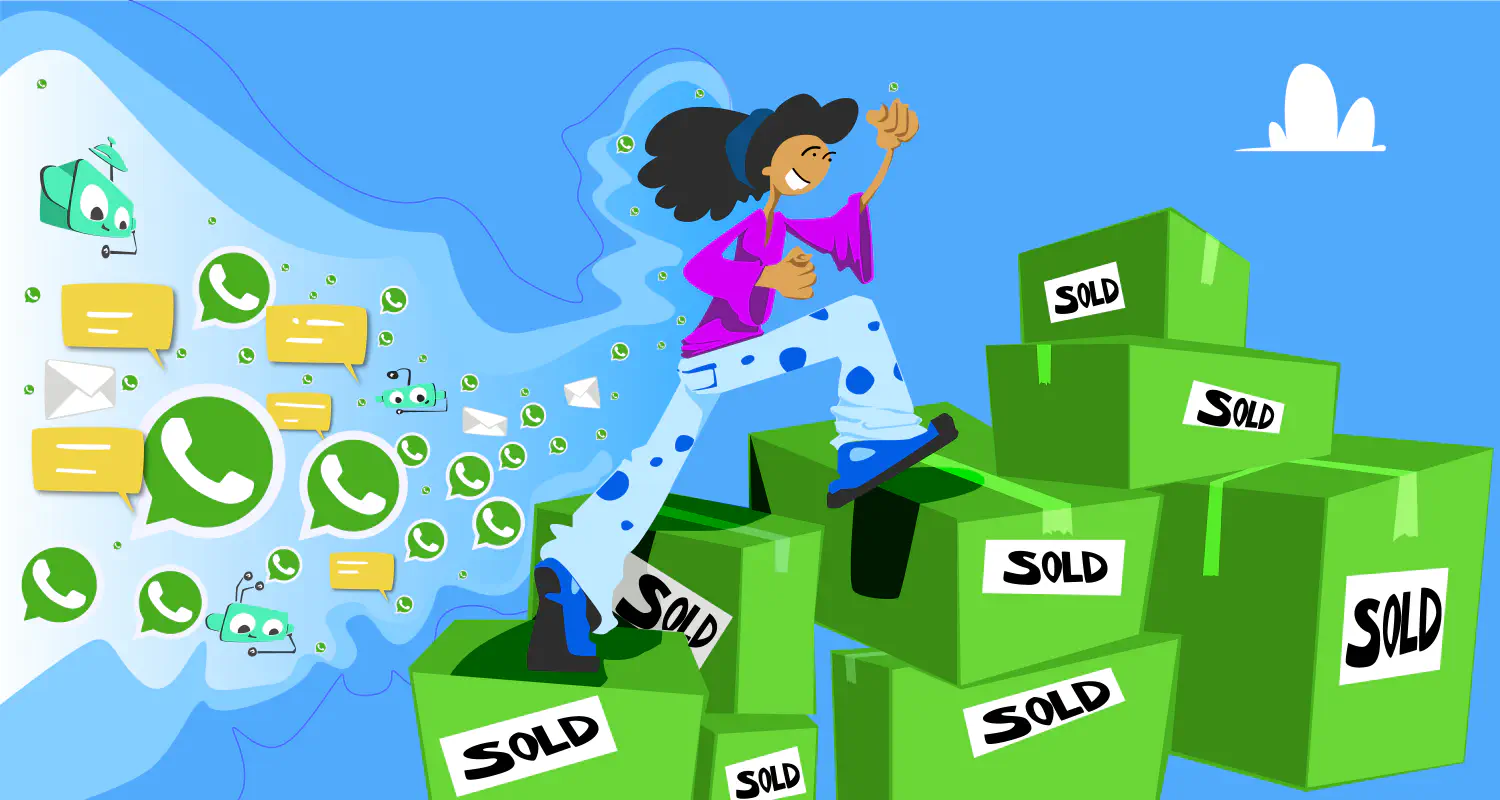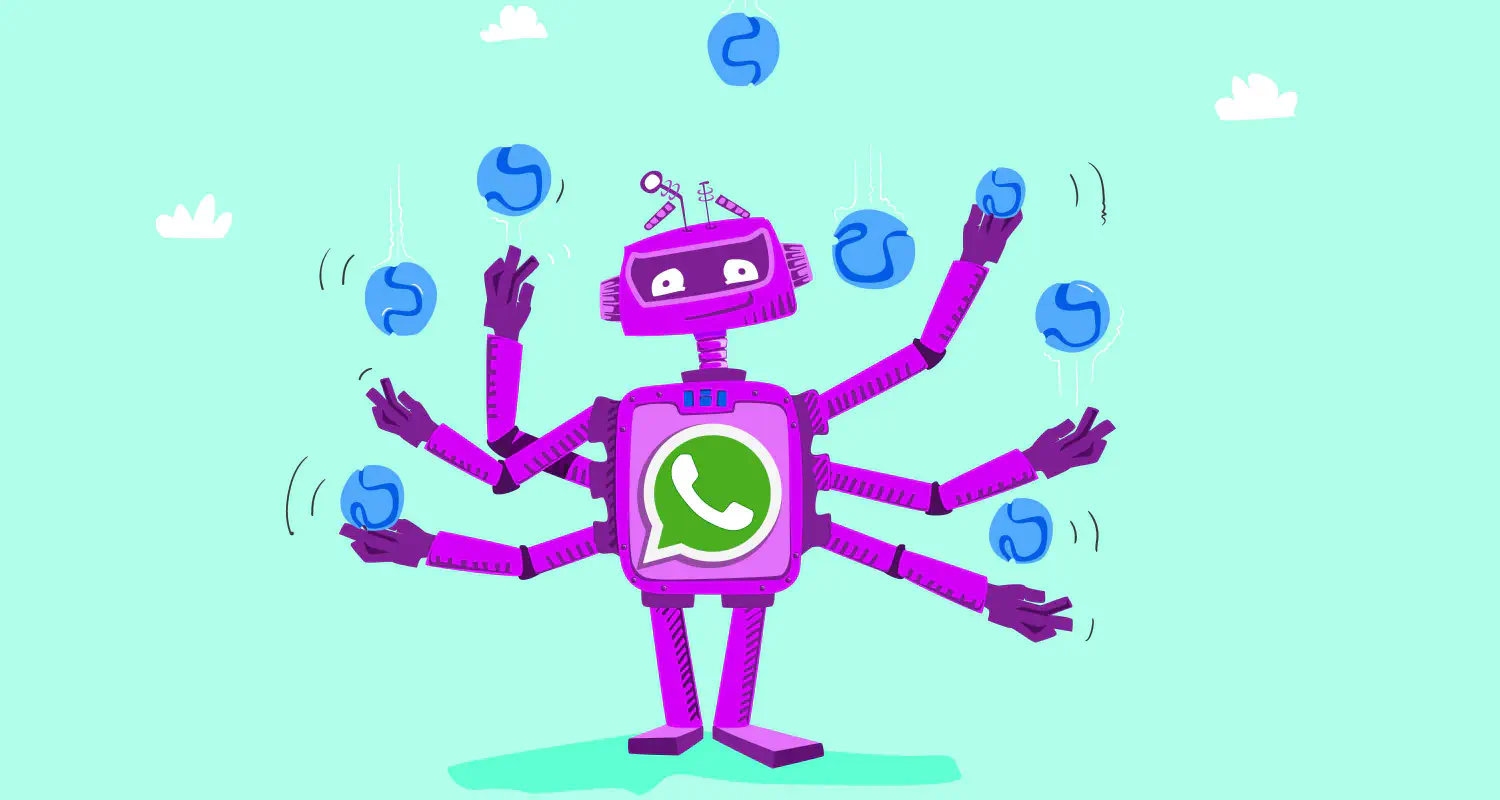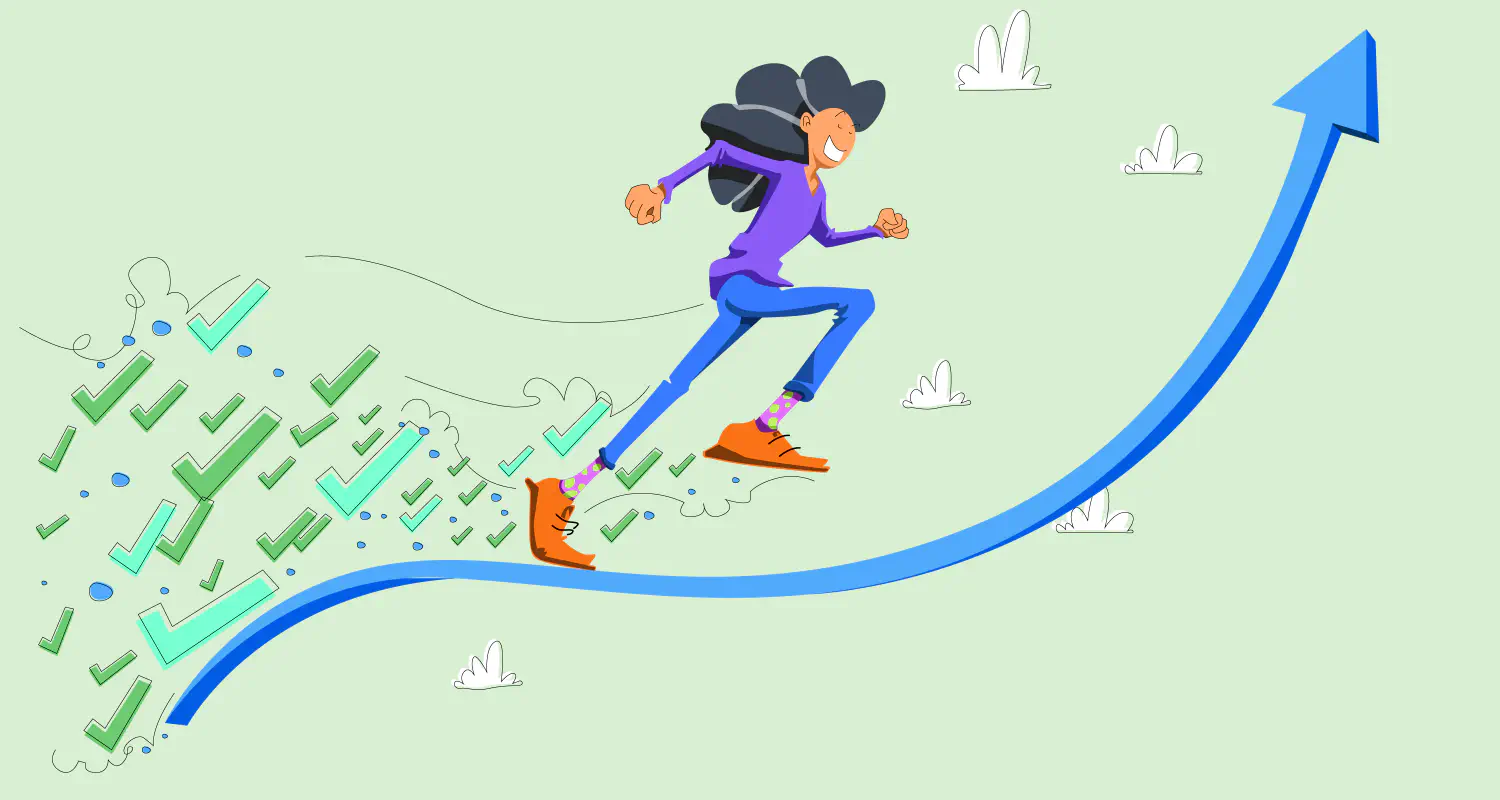What Is a Sales Funnel and How to Build One on WhatsApp
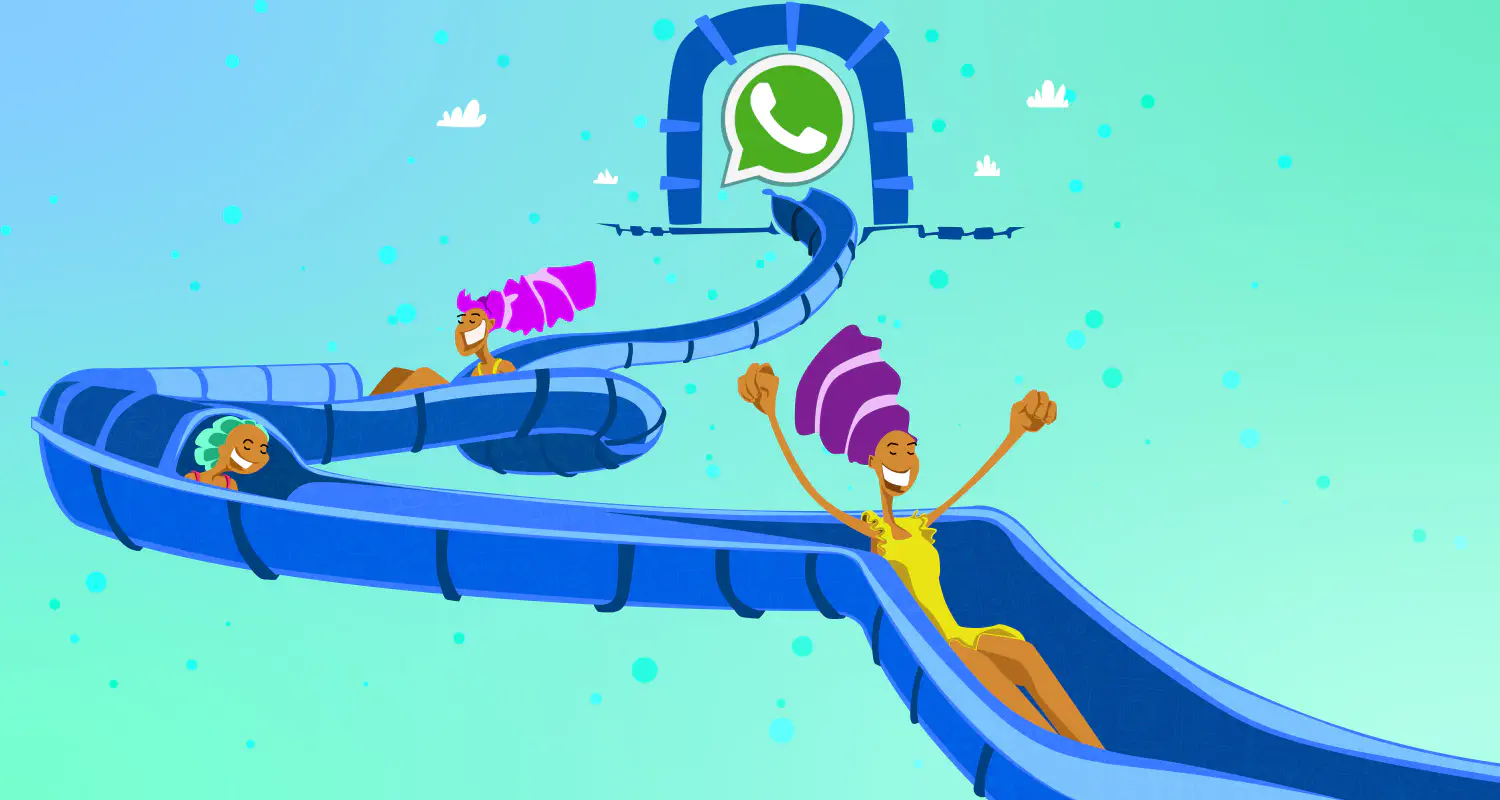
Customers go through multiple steps before they purchase your product. They first learn about it, develop interest, and then start considering. These stages are called the sales funnel, and every sales team needs one to guide prospects from first contact to closed deal.
But building a funnel has its challenges. You need a lot of tools to make it work, like CRMs, sales acceleration, sales enablement, etc. It’s also tough when your business starts to scale because your team struggles to keep up with the high demand.
These issues give you slower sales cycles and, more importantly, cause you to drop leads.
One solution is to rethink where you can run your sales pipelines. Instead of spreading it across platforms, you turn to a single, centralized channel where you carry out all the stages. A channel that makes this possible? WhatsApp!
In this article, we’ll walk you through how to build a high-converting sales funnel on WhatsApp and why we think it’s the right step for you.
What is a sales funnel?
A sales funnel is a step-by-step process that you build to guide customers through the buying journey. It starts with the discovery of the product and ends with buying.
The reason it’s called a funnel is that the number of customers goes down every stage because not every interested prospect makes a purchase.
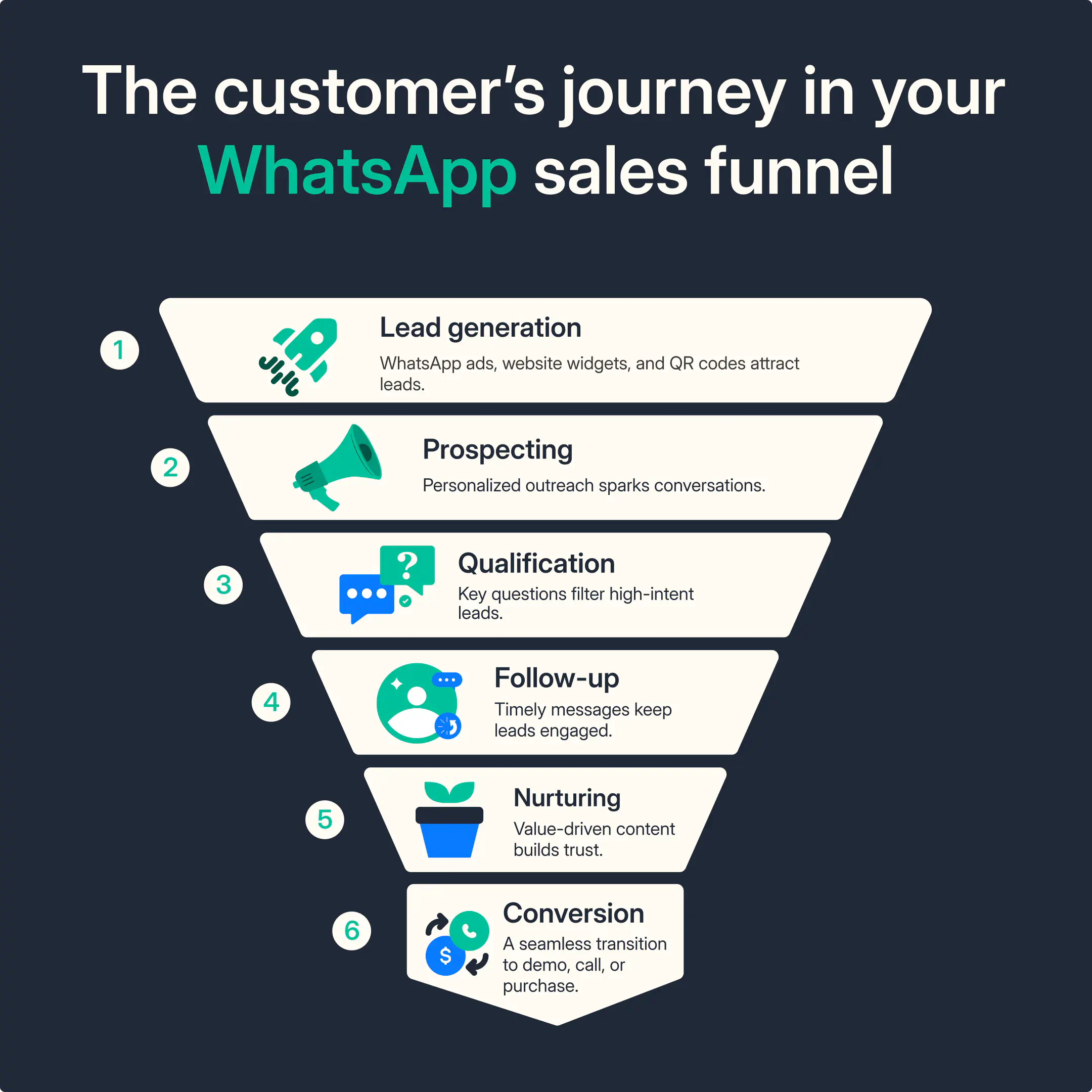
The stages of a sales funnel are:
- Awareness: Potential customers discover your business through ads, content, or word-of-mouth. They’re not ready to buy yet—just learning you exist.
- Interest: They start engaging with your brand (e.g., visiting your site or consuming content) and see your product as a possible solution.
- Consideration: Prospects compare your offering with competitors, evaluating how well it meets their needs. Demos or consultations often happen here.
- Decision: They’re close to buying but need to overcome final hurdles like budget or approvals. This stage requires strong follow-up and reassurance.
Why do B2B companies need a sales funnel?
B2B companies need a sales funnel to organize the buyer’s journey and guide customers through a structured process, rather than improvising and ending up with a chaotic process. It provides a clear roadmap for teams to follow so that they don’t have to rely too much on guessing.
Here’s a list of reasons why a sales funnel is essential for your business.
- Creates a clear path: B2B buyers often need multiple touchpoints before making a decision. A sales pipeline breaks that journey into stages so that you can deliver the right message at the right time. Instead of sending all leads the same sales pitch, you meet them where they are.
- Prioritizes time and resources: A structured sales process helps your team identify which leads are more promising so that they can focus their efforts where they’ll get results.
- Provides visibility: Sales funnel stages help you track where leads are dropping off and where your team needs to improve. This data is critical in long B2B cycles, which studies show can reach up to 8 months.
- Builds better customer relationships: Maintaining a direct line of contact with the customers through the sales pipeline stages helps you build strong relationships that later translate to sales.
What tools do you need to manage your sales process?
A multi-step sales process isn’t just a concept you can keep in mind while dealing with customers. It’s more of an action plan that you manage using a lot of tools.
Here are the tools you need to manage a sales customer journey:
- CRMs: Store customer data and keep a historical record of all their interactions. They help you track the sales funnel progress and where each prospect is in the funnel.
- Sales engagement tools: Offer built-in communication features to help you with customer outreach. You can use them to send emails and track calls. They’re especially important during outreach, lead nurturing, and qualification.
- Sales enablement tools: Help your sales team access, organize, and deliver the right content at every stage of the buyer’s journey.
- Sales acceleration platforms: These platforms automate sales tasks like routing leads and updating CRMs to make your sales cycle smoother and shorter. They’re important for the mid-to-late funnel stages, where they can automate proposal generation, e-signatures, or deal stage updates.
Even though each tool serves a purpose, using them separately can be a mess. You’ll have to switch multiple tabs every time you want a single piece of information, and if the tools don’t sync, you risk losing information.
That’s why you need a modern way to run sales. A way where each of your tools sits in one place, and you can access them without switching a single tab. Modern B2B sales teams have been turning to WhatsApp for this, and we think it’s the way to go.
And while the free WhatsApp Business app is great for small businesses, scaling teams need something more powerful, like the WhatsApp Business Platform.
Building a sales funnel on the WhatsApp Business Platform lets you:
- Sync with your CRM
- Trigger workflows in your sales acceleration tools
- Deliver sales enablement content automatically to prospects
- Keep all interactions in one, continuous thread
You still need your tools, but WhatsApp becomes the hub that connects them. One space to talk to leads, move deals forward, and keep everything in sync behind the scenes.
This is becoming the new standard, and if you’re still working with disconnected tools, you might be a step behind.
How to build a sales funnel on WhatsApp
Here’s what you need to do at each stage of your WhatsApp sales pipeline to turn more prospects in customers:
1. Awareness
At the awareness stage, your job is to reach new prospects and bring them into your funnel. This starts with prospecting (which can also be done over WhatsApp), where your team actively identifies and contacts ideal leads and invites them to start a WhatsApp conversation.
Once engaged, you begin capturing inbound interest through lead generation on WhatsApp, such as ads with click-to-chat, QR codes, or website widgets.
Then, when customers contact you, you can use simple automated templates to welcome them and introduce your pitch. Because of the conversational nature of the platform, they won’t feel the usual pressure of formal emails and calls, and you’ll be able to build rapport with them.
2. Interest
Once a prospect starts communicating with your business, it means they’ve moved beyond awareness and are now interested. This is where you focus on qualifying leads through WhatsApp by asking the right questions, understanding their pain points, and identifying if they’re a good fit.
The next step then is using WhatsApp to distribute leads to the right sales rep, based on criteria like region, deal size, or product need. A well-designed sales funnel can help you automate this step so that you can start nurturing your WhatsApp leads with helpful communication.
3. Consideration
At this stage, prospects are seriously evaluating your product. They might ask about features, pricing, or onboarding timelines. This is the right moment to schedule demos directly through WhatsApp, making it easy for the buyer to pick a time and move forward.
After the demo or discovery call, momentum matters. WhatsApp helps you follow up with leads quickly to share materials, handle objections, and check in to keep things moving without switching to email or another tool. Also, the platform’s centralized view helps you identify where customers are in the funnel and spot leads who have gone dormant during this stage.
4. Decision
Now the prospect is close to buying, but timing, budget, or internal approvals might still be in play.
Here, WhatsApp helps you stay close to the buyer without overwhelming them.
You can answer last-minute questions quickly and nudge decision-makers without it feeling like pressure. Not to mention, WhatsApp’s automation features can help you scale all of these efforts without overwhelming your team. This way, you’re able to close your deals on WhatsApp faster.
After you’re done with these stages, it’s time to guide your customers toward the customer support funnel, where you can provide post-sales support and convert customers to loyal advocates.
Check out our guide on building a high-impact customer support funnel on WhatsApp.
Conclusion
When it comes to well-structured sales processes, WhatsApp offers something other platforms don’t: direct, real-time access to your buyers in a space they already trust and use daily.
Whether you’re just getting started or looking to scale, WhatsApp gives you flexible options.
The WhatsApp Business app is ideal for smaller teams managing simple conversations, while the WhatsApp Business Platform unlocks advanced capabilities like integrations and automation for larger, fast-moving sales teams.

Hania is a seasoned researcher and content writer specializing in WhatsApp Business and its role in B2B sales and customer engagement. With years of experience creating in-depth, thought-provoking content, she combines real-life use cases and deep industry insights to help businesses leverage WhatsApp as a growth tool. Her expertise lies in translating complex research into actionable strategies, making her a trusted resource for companies looking to innovate their communication and sales processes.

